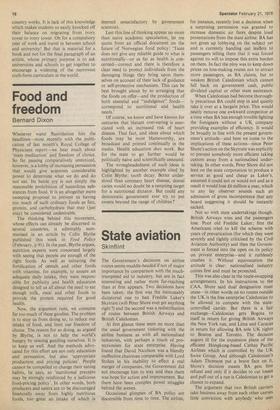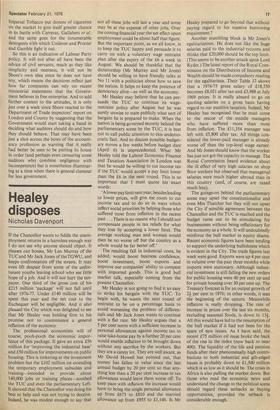State aviation
Skinflint
The Government's decisions on airline routes seems muddle-headed if not of major importance by comparison with the muchtrumpeted aid to industry, but are in fact interesting and rather more far-reaching than at first appears. Two decisions have been taken: the first was the inexcusably dictatorial one to ban Freddie Laker's Skytrain (will Peter Shore ever get anything right ?) and the second was a redistribution of routes between British Airways and British Caledonian.
At first glance these seem no more than the usual government tinkering with the airline business as with all nationalised industries, with perhaps a touch of protectionism for state enterprise. Having found that David Nicolson was a blandly ineffective chairman comparable with Lord Stokes in his inability to effect a real merger of companies, the Government did not encourage him to stay and then there was hope for action and improvement. But there have been complex power struggles behind the scenes.
Occasional glimpses of BA policy are discernible from time to time. The airline, for instance, recently lost a decision when a surprising permission was granted to increase domestic air fares despite loud protestations from the state airline. BA has not given up lobbying on the subject yet and is currently handing out leaflets to passengers telling them that it was forced against its will to impose this extra burden on them. In fact the ploy was to keep down prices on loss-making routes not to attract more passengers, as BA claims, but to weaken British Caledonian which cannot fall back on government cash, public dividend capital or other state assistance.
When Caledonian had become thoroughly precarious BA could step in and quietly take it over at a bargain price. This would neatly remove one awkward competitor at a time when BA has enough trouble fighting the foreigners without a UK company providing examples of efficiency. It would be broadly in line with the present government's attitude—and here we come to the implications of these actions—since Peter Shore's action on the Skytrain was explicitly to prevent somebody more efficient taking custom away from a nationalised undertaking. In other words, Peter Shore did not lean on the state corporation to produce a service as good and cheap as Laker's, assumed it could not or would not and as a result it would lose £.6 million a year, which to any lay observer sounds such an admission of gross incompetence that any board suggesting it should be instantly sacked.
Not so with state undertakings though. British Airways wins and the passengers lose. Poor old Freddie Laker; first the Americans tried to kill the scheme with years of prevarication (for which they were severely and rightly criticised by the Civil Aviation Authority) and then the Government is forced into the open on its policy on private enterprise—and it ruthlessly crushes it. Without equivocation the attitude is clear: nationalised industry comes first and must be protected.
This was also clear in the route-swapping arrangements. In his instructions to the CAA, Shore said dual designation must cease—in other words on no routes outside the UK is the free enterprise Caledonian to be allowed to compete with the statecontrolled carrier. But there is a fair exchange—Caledonian gets Bogota to itself in return for giving British Airways the New York run, and Lima and Caracas in return for allowing BA sole UK rights to Boston and Toronto. The decision augurs ill for the expansion plans of the efficient Hongkong-based Cathay Pacific Airlines which is controlled by the UK Swire Group. And although Caledonian's Adam Thomson put a brave face on it, Shore's decision means BA gets first refusal and only if it decides to cut losses and pull out of a run is Caledonian to get a chance to expand.
The argument that two British carriers take business away from each other carries little conviction with anybody who sees Imperial Tobacco put dozens of cigarettes on the market to give itself greater chance in its battle with Carreras, Gallahers et al; and the same goes for the innumerable detergents with which Unilever and Procter and Gamble fight it out.
So this is an indication of Labour Party Policy. It will not after all have been the advice of civil servants, much as they like simplicity and neatness, it will not be Shore's own idea since he does not have any, which means the decisions reflect just how far companies can rely on recent ministerial statements that the Government believes in free enterprise. And to add further context to the attitudes, it is only just over a week since Shore reacted to the Department of Trade inspectors' report on London and County by suggesting that the Government would start taking a hand in deciding what auditors should do and how they should behave. That may have been just a shot across the bows of the accountancy profession as warning that it really had better be seen to be putting its house in order (and perhaps even censuring some auditors who combine negligence with incompetence) but is nonetheless illuminating at a time when there is general clamour for less government.



































 Previous page
Previous page